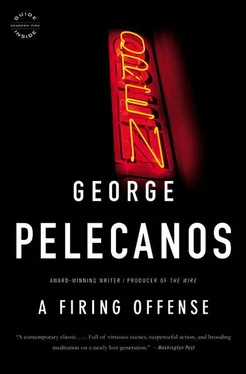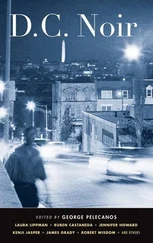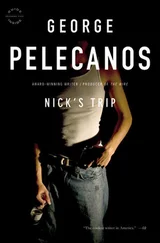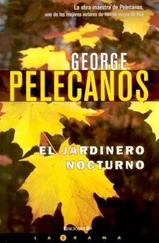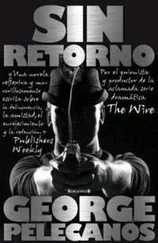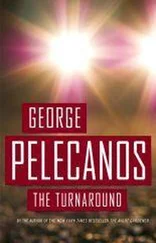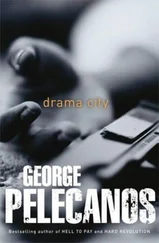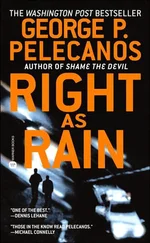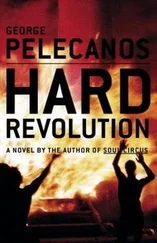George Pelecanos - Firing offence
Здесь есть возможность читать онлайн «George Pelecanos - Firing offence» весь текст электронной книги совершенно бесплатно (целиком полную версию без сокращений). В некоторых случаях можно слушать аудио, скачать через торрент в формате fb2 и присутствует краткое содержание. Жанр: Криминальный детектив, на английском языке. Описание произведения, (предисловие) а так же отзывы посетителей доступны на портале библиотеки ЛибКат.
- Название:Firing offence
- Автор:
- Жанр:
- Год:неизвестен
- ISBN:нет данных
- Рейтинг книги:4 / 5. Голосов: 1
-
Избранное:Добавить в избранное
- Отзывы:
-
Ваша оценка:
- 80
- 1
- 2
- 3
- 4
- 5
Firing offence: краткое содержание, описание и аннотация
Предлагаем к чтению аннотацию, описание, краткое содержание или предисловие (зависит от того, что написал сам автор книги «Firing offence»). Если вы не нашли необходимую информацию о книге — напишите в комментариях, мы постараемся отыскать её.
Firing offence — читать онлайн бесплатно полную книгу (весь текст) целиком
Ниже представлен текст книги, разбитый по страницам. Система сохранения места последней прочитанной страницы, позволяет с удобством читать онлайн бесплатно книгу «Firing offence», без необходимости каждый раз заново искать на чём Вы остановились. Поставьте закладку, и сможете в любой момент перейти на страницу, на которой закончили чтение.
Интервал:
Закладка:
“Thought I might bring home a bag of sparrows. For my cat.”
“Sounds yummy. But why don’t you put that thing away. He keeps it in the radio room, where he keeps his beer.”
I entered the small room, had trouble finding the light switch, and groped along the wall for the spot of boxes where he usually stashed his paraphernalia. I looked to my left and saw that Lee was behind me, silhouetted against the low-wattage bulb of the office. I clumsily stashed the gun behind the nearest box.
“Where are we going?” she asked. She was near me, and her hand touched mine.
“The Corps,” I said.
“I like that place.”
“Good.” I moved closer and felt her warm breath near my face. “Thanks for helping tonight. Things got a little out of hand towards the end.”
“You’re welcome,” she said.
I cupped the back of her head and kissed her. Her tongue slid over my teeth and along the roof of my mouth. She pulled her mouth away and arched her back. I moved my hand inside the top of her shirt, reached into her loose bra, and lightly skimmed her swollen nipple. She kissed me harder this time and made a guttural sound. I reached down with my right hand and tugged on the back of her upper thigh below her but tocks, pulling her lower body up as she ground it into mine. We broke apart, and she pushed some hair away from her face.
“Well, then,” she said, and exhaled. “Let’s get going.”
SEVEN
The three of us were in the front seat of my Dodge and heading downtown. McGinnes had slithered into Mr. Liquor and had emerged, mercifully, with only a six of domestic that we were now trying to kill before we reached the club.
“Drink up,” McGinnes explained, as Lee elbowed my ribs. “The way the prices are in these places now, you’ve got to catch a buzz before you go in.”
I started to push a tape into the deck, but Tom T. was on HFS and launching into a propulsive set that was kicked off by Camper Van Beethoven’s reggae-fueled “One of These Days.” I let that ride.
We cut down Cathedral into the park, then took Pennsylvania Avenue across town. As we passed the White House, McGinnes reached across Lee and blasted the horn on the steering wheel, raising his beer to toast the protesters squatting in Lafayette Park.
In the area of the National Theater I hung a left and drove around the block a couple of times looking for a space. Between the revitalized Willard and the Shops there was plenty of nighttime congestion in this area now. I ignored McGinnes’ repeated shouts, over the wailing sax solo in the Cure’s “A Night Like This,” to park illegally, and eventually found a spot.
Lee and I crossed the street and looked back to see McGinnes standing in the middle of the road, his head fully tilted back, his small belly protruding, as he shotgunned the remainder of his beer. A carload of kids honked as they drove by, and McGinnes held out his empty so that they could see the label, then met us on the sidewalk.
There was no midweek line on the polished stone steps of the Corps. A pumped-up guy in a muscle shirt with a blond mass of hair that had been plastered up to resemble a slab of cake opened the door and blocked our way. The thud of heavy bass came out with him.
“Five dollars,” he said coldly, with a fashionably down-under accent. I had loosened my tie and was wearing black pleated trousers with a blue oxford. Lee, of course, looked fine, but when the doorman got a look at McGinnes, polyestered to the nines and swaying on the steps with unfocused eyes, he seemed to regret asking us in.
“We’re with the band, mate, ” McGinnes said.
“There is no band, mate. Five dollars.”
We paid the cover and entered. I noticed the doorman signal another muscleboy next to the bar, pointing in particular to McGinnes, who was already pushing through the crowd to get to one of the several bars around the dance floor. The DJ was blasting some anonymous House music, and the air was very warm and damp.
Little had been done to the club since it had been converted from an old bank, a stately blend of marble and brass. As a child, I had come here with my grandfather, stepping on Fem" osince it h the shiny floor with deliberate force to produce a cavernous echo that would raise the heads of the elderly, wool-suited tellers. Now it was one of those trendy “new wave” clubs that had sprouted up in this part of town, and in Adams Morgan and around Dupont Circle, but was in fact less new wave than seventies disco.
We had seen this coming in the early eighties, when Devo had a Top Forty novelty hit with “Whip It,” when major labels began scrambling to sign any groups wearing skinny ties and funny haircuts. About this time the Angry Young Men, originals like Costello and Graham Parker, were eclipsed by no-talent fops like Duran Duran and Frankie Goes To Hollywood. We began to realize that those early years, of the punk and new wave emergence, of rediscovering ska and dance music, of separation and alienation from all the youth movements that came before us, were over.
The result was clubs like the Corps (an utterly false play on the term hardcore), where Reagan youth, wealthy AU and GW students, and gold-chained, coke-carrying sons of diplomats came to party. These “struggling” students got their forty dollar “punk” haircuts, paid the seven dollar cover, drank five dollar, sugar-filled, lime-necked beers, and danced to the new wave beat.
I looked at them on the dance floor, enshrouded by the smoke of dry ice, while New Order pumped through the speakers. They were perfectly coiffed, with their predominately black with-a-touch-of-white uniforms, fashionably bored looks on their blankly androgynous faces. I turned to the bar for a beer.
When I caught her eye, a woman stepped into a light that was spotted up, which accentuated her thick, white makeup and black hair. She had a tight cocaine smile and lifeless eyes. It seemed a struggle for her to unglue her lips.
“What can I get you?” she asked, wiping in front of me with a bar rag.
“I’ll take a Bud.”
She produced one and uncapped it with an opener that was attached to the cooler with fishing line. She reached for a glass but replaced it as I waved it away. I grabbed the beer by the neck, had a long pull, and bent over the bar. She leaned her ear in towards my mouth.
“Joe Martinson still work here?” I asked.
“He’s working the upstairs bar,” she said, too loudly.
“How much for the beer?”
She held up three fingers. I tossed four on the bar and made my way around the dance floor to the regally wide marble staircase leading to a balcony that surrounded the entire club. Young coeds with loose coat-of-arms sweaters passed me as I walked up, descending the stairs slowly and unemotionally like drugged debutantes.
I found Martinson behind a barely lit bar in the corner, doing what was probably a placebo shooter with three cute college-age girls. They laid down a ten and walked away. I stepped up to the bar.
I’d got to know Joe Martinson when he was a bartender at a wild, short-lived, tiny dance bar near Chinatown aptly called the Crawlspace. At the time his trademark was cotton oxford shirts, the sleeves of which he tore off an Ke tiny dance d fashioned as headbands. The bar was always sweatsoaked and to capacity with drunks, and opened at about the time that slam-dancing had a brief run of popularity in D.C. The slamming eventually closed it down, when some Potomac preppies came in for “the experience,” walked out with bloody noses, and sued the owners. But for one hot, lunatic summer, that had been the place to go.
“Nick,” he said, and shook my hand. He was wearing black pants with a tuxedo shirt and a black bow tie. Though working out had heavied him up in the chest and shoulder department, he looked less tough than in his earlier, wiry incarnation. “What are you doing here?”
Читать дальшеИнтервал:
Закладка:
Похожие книги на «Firing offence»
Представляем Вашему вниманию похожие книги на «Firing offence» списком для выбора. Мы отобрали схожую по названию и смыслу литературу в надежде предоставить читателям больше вариантов отыскать новые, интересные, ещё непрочитанные произведения.
Обсуждение, отзывы о книге «Firing offence» и просто собственные мнения читателей. Оставьте ваши комментарии, напишите, что Вы думаете о произведении, его смысле или главных героях. Укажите что конкретно понравилось, а что нет, и почему Вы так считаете.
